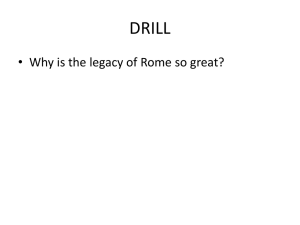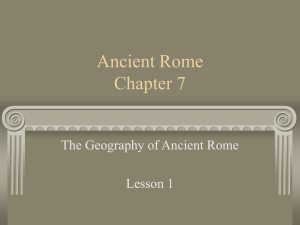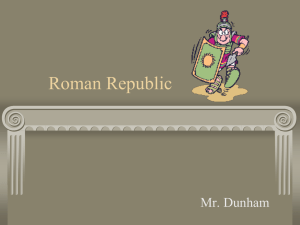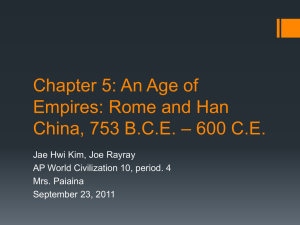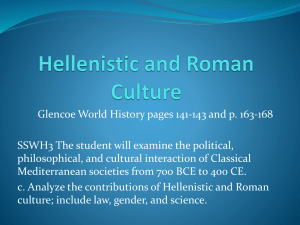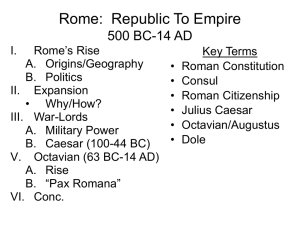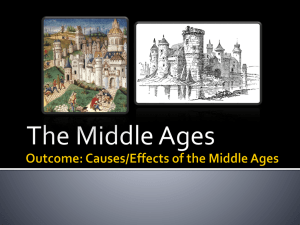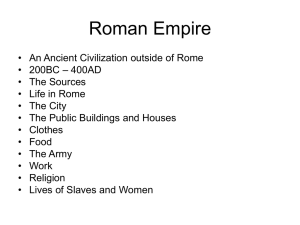THE HISTORY BOYS
advertisement
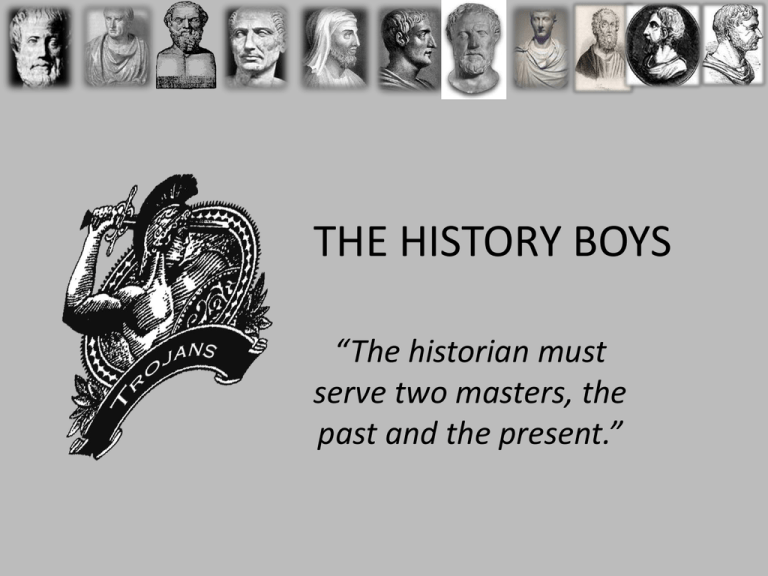
THE HISTORY BOYS “The historian must serve two masters, the past and the present.” “It was those “great and marvelous deeds” and the attempt to explain why they came about that justified the whole effort, including the broader inquiries into earlier times and distant peoples.” Donald Kagan Despite the professed aim to accurately record the deeds of men, ancient authors were blinkered by their personal class bias, by their social context and gender bias and by their Historical context where events were the outcome of capricious gods or great men. Their writings were more about belief than truth. HERODOTUS Herodotus (c. 484-425 B.C.), as the first historian proper, is called the father of history. He was born in the essentially Dorian (Persian colony) of Halicarnassus on the southwest coast of Asia Minor (then a part of the Persian Empire), during the Persian Wars shortly before the expedition against Greece led by the Persian king Xerxes. Herodotus was exiled from Halicarnassus for his involvement in a revolt to overthrow the Persian tyrant. He travelled widely before settling in Greece. Thucydides Thucydides (born c. 460-455 B.C.) had first hand information about the Peloponnesian War from his pre-exile days as an Athenian commander. During his exile he interviewed people on both sides and recorded their speeches in his History of the Peloponnesian War. Unlike his predecessor, Herodotus, he didn't delve into the background but laid out the facts as he saw them, chronologically. He does admit that where there were gaps in his knowledge he invented speeches for his characters. He is sometimes referred to as the Father of Scientific History since his History was heavily political and military, unlike Herodotus. XENOPHON An Athenian, Xenophon was born c. 444 B.C. and died in 354 in Corinth. Xenophon served in Cyrus' forces against the Persian king Artaxerxes in 401. After the death of Cyrus Xenophon led a disastrous retreat, which he writes about in the Anabasis. He was exiled from Athens and fled to Sparta where he became good friends with the King Agesilus. He so admired the Spartan society that he stayed and raised a family there. He later served the Spartans even when they were at war against the Athenians. He wrote a text on Spartan Society. ARISTOTLE Aristotle was born around 384 BC in Stagirus on the Chalcidic peninsula of northern Greece, to Nicomachus, a medical doctor, and Phaestis. Born at Stagira in northern Greece, Aristotle was the most notable product of the educational program devised by Plato; he spent twenty years of his life studying at the Academy. He wrote on many different subjects, including physics, metaphysics, poetry, theater, music, logic, rhetoric, politics, government, ethics, biology and zoology. His admiration for 4th century Athens caused him to be very critical of her enemy Sparta, not only their constitution but the power women held in society. POLYBIUS Polybius (c. 203? - 120 BC) was a Greek historian and influential politician of the Achaean League prior to Roman influence. Against local Greek and Macedonian interests in the Macedonian Wars, Polybius was deported and went to Rome. While in Rome he became a patron of such people as Aemilius Paullus and the Scipio family where he developed a great appreciation for Roman culture and power. In this arrangement, Polybius began his great work of history covering the Mediterranean world between the years 220 and 146 BC. Of the 40 book epic, only 5 have survived intact, but large fragments of others are still available. Polybius was a meticulous researcher and his work shows a great deal of unbiased accuracy. Of particular importance is his treatment on the Punic Wars. JULIUS CAESAR A Patrician born Caesar lived in the last century of the Roman Republic. He rose to become Dictator of Rome and extended the empire adding Gaul.. Caesar meticulously tracked his own campaigns in Gaul and in the Civil War, not only for the historical record, but as propaganda against his political enemies. With his deeds in writing, and available for the populace, the Senate found it impossible to attack Caesar's popularity with the common people. Aside from an account of his campaign, "The Conquest of Gaul" is one of the few primary source pieces of literature regarding the tribes and customs of Gallic Celts. The Civil War provides additional in-depth, though biased, analysis of this turbulent time in Roman history. CICERO Marcus Tullius Cicero (106 - 43 BC) was one of the most influential players in the period of Rome's late Republic. He was a conservative statesman, politician, lawyer and general defender of Republican principals. Generally regarded as the greatest orator in the history of the world, Cicero was an opponent, and sometimes rival to Caesar, reflecting the Senatorial hatred of a populare. Thanks in large part to Cicero's diligent letters and speeches; the modern world has a brilliant historical view of the closing days of the Roman Republic. While speeches were written the rhetoric and political bias for public consumption many surviving letters and other works tell a more intimate tale of these turbulent times. DIODORUS SICULUS Diodorus Siculus was a Sicilian Greek historian who lived from 90 to 21 BC. He wrote, a world history in 40 books, ending it near the time of his death with Caesar's Gallic Wars. Fully preserved are Books I-V and XI-XX, which cover Egyptian, Mesopotamian, Indian, Scythian, Arabian, and North African history and parts of Greek and Roman history. His histories, while not considered great scholarly material in their own right, borrowed heavily from other writers whose works are now lost. In this regard, Siculus is valuable as a historical record for those writers who came before him. JOSEPHUS Josephus (AD 37 – c. 100), and, after he became a Roman citizen, as Titus Flavius Josephus, was a first-century Jewish who survived and recorded the destruction of Jerusalem in AD 70. He fought the Romans in the First Jewish-Roman War of 66– 73 as a Jewish military leader in Galilee, but somehow not only survived but earned the patronage of the Flavian Emperors. He acted as mediator between Rome and the Jews and later wrote an account of the Jewish revolt. He has been criticized for his very pro Roman view of events. APPIAN ( 90-160AD )Appian is an often underrated Roman historian, who lived during the height of Roman power and the era of the '5 Good Emperors'. Because of the nature of his work, a collection of many separate geographic and period histories, his contribution to Roman history is sometimes overlooked. However, his original 24 books, written in Greek, provides valuable insight into several aspects of the Roman world. Of considerable value is his treatment on the civil wars of the late Republic.He writes from a very Pro Roman , elite standpoint. PLUTARCH Plutarch is known for writing biographies of famous ancient people ( Parallel Lives where he sought to show how Greek and Roman leaders were similar ) Since he lived in the first and second centuries A.D. he had access to material that is no longer available to us which he used to write his biographies. His material is easy to read in translation., however he writes with a vice or virtue agenda. Given the biographical nature he was able to select those events which supported his agenda TACITUS P. Cornelius Tacitus (A.D. 56 - c. 120) may have been the greatest Roman historian. Gre up in a very wealthy provincial family, possibly in Gaul. He held the positions of senator, consul, and provincial governor of Asia. He wrote "Annals," "Histories,“ about the Julio Claudian emperors. His thesis was in understanding what qualities made a good ruler and whether people had the right to overthrow a bad ruler. "Agricola,“ was about his Father in Law and his governorship of Britain, "Germany," and a dialogue on oratory. In his Histories he was scathing of Domitian’s rule although owed much of his career fortunes to Domitian LIVY Titus Livius (59 BC-AD 17) is among the more important Roman historians. He lived most of his life in Rome where he had a prominent education and studied diligently. It was suggested that Livy was a major source of encouragement for the future Emperor Claudius in his historical studies. Livy's life work, the History of Rome from its founding, is a richly detailed account of Rome's early history. Livy, however, was filled with Roman patriotism and painted a romantic view of the ancient world. His sources were mainly the writings of earlier authors and word of mouth legends of the day. Unfortunately, while he paints one of the few existing ancient source pictures of ancient Rome, lack of careful evaluation of his sources make some facts disputable. Regardless, the description of early legendary Rome, as well as the complete work, is a lasting and supremely important testament to Roman history. Living in the time of Augustus, later historians, such as Tacitus labeled him as a Republican sympathizer, but unfortunately, Livy's books covering this period have not survived. DIO CASSIUS Dio Cassius Cocceianus (155 - 235? AD) was a Roman historian and Senator who began a steady rise in Roman politics under Commodus. While an able administrator and military commander, he was appreciated more for his literary work both by his contemporaries and in the modern world. His great work partially lost, was a history of Rome (written in Greek) from the earliest times until the early 3rd century AD. Of the original 80 books, 19 survive in full. They are a distinguished and invaluable source for the period of the later republic and the first two centuries AD. Dio Cassius worked diligently to relate his history in an unbiased nature, while understanding the necessity for certain balances when it came to reporting on the various Emperors or political powers of the time


